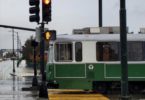By Elise Takahama
BU News Service
BOSTON – Massachusetts’ 15 regional transit authorities need increased funding to enable them to provide reliable, environmentally sustainable service that better meets the needs of their communities, according to a task force charged with reviewing the operation of systems that provide bus service for millions of state residents.
The Task Force on Regional Transit Authority Performance and Funding, which includes state legislators, RTA administrators and rider advocates, has been meeting weekly since last October to investigate how transit authorities could better improve services for their communities, maximize ridership and ensure they were receiving adequate funding. Earlier this month, the group finally released its report with 24 recommendations.
Almost half of the recommendations focused on specific service decisions the 15 state RTAs should consider – including developing pilot programs that test different transit models, encouraging multiple RTAs to work together to increase access to communities, providing a paratransit service in compliance with the Americans with Disabilities Act requirements and testing out micro-transit or on-demand bus services.
But the biggest takeaway from the report was the new $90.5 million base funding for the RTAs.
In January, Gov. Charlie Baker proposed sending $86 million to RTAs, up from his $80.4 million level-funding proposal but short of the $88 million allocated by the Legislature to the Massachusetts Department of Transportation.
The House Ways and Means Committee matched the $86 million proposal in its budget unveiled Wednesday.
A recommended jump to $90.5 million – with regular annual increases – was received well by local transit authorities.
James Scanlan, administrator of the Lowell Regional Transit Authority, said one of the things he was most pleased about was the recognition the report gave to the RTAs in the state.
“It recognizes the great service that public transportation does provide, whether it be the MBTA or RTAs for the commonwealth,” Scanlan said. “It recognizes the need that there has to be an investment into the systems so they can fulfill their missions.”
Scanlan said the LRTA was definitely going to use the task force’s report as a guide in the future to hold themselves accountable.
“We’re all challenged because … public transportation on the bus side has been declining in the last few years,” he said.
The extra funding, if forthcoming, would most likely help the LRTA get its new Sunday service pilot program off the ground. Last month, MassDOT awarded RTAs grant money for specific projects, and Lowell’s grant went toward a new Sunday bus service, which is scheduled to run through Lowell, Tyngsboro, Dracut, Tewksbury, Billerica, Westford and Chelmsford from about 9:30 a.m. to 5:30 p.m., Scanlan said.
The transit authority is aiming to launch the pilot service on June 16, Scanlan said.
“But as we go forward, that’s only a pilot,” he said. “In order to continue those types of new services, we’re going to need additional funding … We’re hoping this additional money comes and we can move from pilot to full-time service.”
Mohammed Khan, the administrator of the Montachusett Regional Transit Authority, based in Fitchburg, said the recommended $90.5 million increase would go a long way toward helping transit authorities like MART improve service.
“We’re happy it’s been recognized. … More or less, it was static funding and when you’re dealing with inflation, labor costs and others, all of us had to reduce our services,” Khan said. “In Fitchburg and Leominster, we’ve had to reduce some services in that whole area and now we should be able to maintain those services.”
MART Deputy Administrator Bruno Fisher agreed that the task force’s report was very thorough and well-informed, adding that it also recommended RTAs increase communication between each other and focus on providing access to as many communities as possible.
“It’s not all about ridership,” Fisher said. “Certainly ridership is important, but customer service, customer satisfaction, hours that are operated and all of that are just as important. If you just look at the numbers, you might not run a service that’s critical to the elderly or disabled or priority workforce or low-income population. But those are the people that need it the most.”
The task force’s report also drew attention to measures that would keep the RTAs environmentally sustainable. In an effort to reduce greenhouse gas emissions from the transportation sector by at least 40 percent by 2040, the report said, all new cars, light-duty trucks and buses in Massachusetts will be electric.
“It’s not just important for people in the Boston metro region,” Fisher said. “It’s important for everyone. … People who don’t have a car have to get around. If you’re going to cut back on greenhouse gases and try to make the environment better, public transportation’s the way to go.”
This article was previously published in the Lowell Sun.




